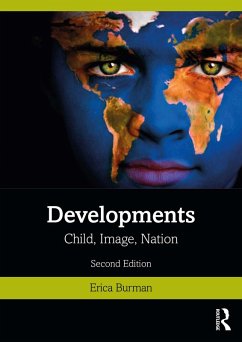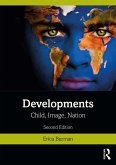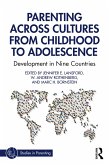Dieser Download kann aus rechtlichen Gründen nur mit Rechnungsadresse in A, B, BG, CY, CZ, D, DK, EW, E, FIN, F, GR, HR, H, IRL, I, LT, L, LR, M, NL, PL, P, R, S, SLO, SK ausgeliefert werden.
Zsuzsa Millei, Professor of Early Childhood Education, Tampere University, Finland
Erica Burman's Developments is a masterpiece of reading for submerged constitutive relations: between child and adult, North and South, psychological expertise and social policy .... Tracking the peculiar rhetorical powers of discourses on childhood, the chapters move deftly through a wide range of materials, from aid campaign to classical tragedy to soap commercial to Indian cinema. This new edition extends the transnational frame and updates the conjunctural analysis, taking account of expanding psychologization, austerity, nationalist sentiment, and nostalgic reconstructions of boyhood in the context of feminized labour.
Jennifer Henderson, Associate Professor, Department of English and School of Indigenous and Canadian Studies, Carleton University, Canada
Burman places developmental psychology in ongoing political, development and environmental challenges worldwide, thus offering us an opportunity to see what we are likely to miss if our narratives of human development are monolithic, linear and sans social responsibility ... This book should become a mandatory reading for disciplines such as education, psychology, psychiatry, and development studies as a reminder of the kinds of reflections we need to do before we buy into a single narrative of development.
Manasi Kumar, Senior Lecturer, Department of Psychiatry, University of Nairobi, Kenya
Erica Burman's Deconstructing Developmental Psychology showed in the early 1990's how hegemonic economic models and gender relations were reproduced by psychological theories of development, and subsequently, how important it was to address specific developments, their particular economic and social context, away from grand abstractions and homogeneous developmental models ... In this 2nd edition of Developments, Burman pushes her critical understanding of development further while arguing for the importance of attending to these international perspectives. This completely revised and astounding edition, which includes a new introduction to each chapter and a new section on transnational dynamics, could well work as a proper inoculation against extreme right wing developments worldwide ... while reflecting, in particular, on everyday childhood issues and concerns.
Ángel Gordo, Lecturer in Sociology, Universidad Complutense of Madrid, Spain
Erica Burman is a leading voice in critical (developmental) psychology, and I highly recommend her second edition of Developments: Child, Image, Nation because her transdisciplinary and transnational critique of both psychological and economic developments ... provides her readers with a post-/anti-developmental political conceptualization of childhood, which is both psychosocial and anti-capitalist. Burman shows us that the discourse of psycho-economic development, as exemplified by signifiers like 'growth', 'change', 'stage', 'cycles', 'investment', and 'progress', is a modern rhetoric that is ideologically sustained by the colonial logic of capitalist imperialism, which is inherently oppressive .... This is why Burman frames children, in the context of her critique of the discourse of psycho-economic development, as the oppressed alongside other historically oppressed groups or nations in the Global South and beyond ... In sum, Burman's book undoes the dangerous fantasy of development by deconstructing the complex network of discourses and practices on which it is based.
Robert K. Beshara, Assistant Professor of Psychology and Humanities, Northern New Mexico College









